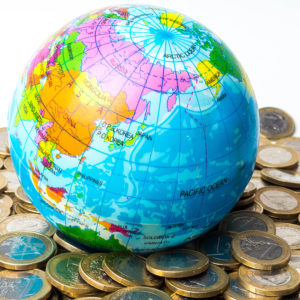
When dealing with negative interest rates in wealthy countries and with geopolitical risks, one can never be too careful.
The American economy is officially in the longest uninterrupted period of growth in U.S. history with an unthinkable 121 consecutive months of gross domestic product expansion. On Monday (July 1), the American stock exchange reached an all-time high, up 18% in 2019.
However, growth forecasts for the global economy are weaker and international trade is stagnating. Is the market too calm and undemanding? This is a crucial question because when the United States and developed countries sneeze, peripheral countries, such as Brazil, get sick.
Interest rates on 10-year Treasury bonds from the following governments are negative: Japan, Germany, Switzerland and France. This anomaly means that investors are expected to receive less than they have invested after 10 years. It is worse than keeping money under the mattress, where, at least, one does not lose it.
The anomaly reveals an alarming prognosis for the global economy’s health, for geopolitical risks or for the eventual deflationary spiral.
Nowadays, more than $12 trillion in bonds have negative interest rates. By way of comparison, Brazil’s general government net debt, which is one of the 10 largest in the world, is about $1 trillion.
The Parable of the Talents, from the Gospel of Matthew, teaches a valuable lesson about investments, interests, risk and entrepreneurship.
A wealthy man entrusted his savings to his three advisers while he traveled for a year. The first and the second advisers doubled the investment by allocating the money to ventures. The third adviser, who had safely buried the money, was punished. The master deemed that he ruined his savings because if he had put the money in the bank, it would at least have earned a profit, with less work. In today’s world, people who invest in bonds with negative interest rates deserve harsher punishment than the one given to the third adviser.
Negative interest rates defy 5,000 years of financial markets, which have always rewarded the waiting and postponement of consumption. Saving accounts have been ruthlessly scoured by inflation in the developed world due to negative interest rates. The feasibility of pension funds, welfare systems and the profitability of banks are under threat.
The intervention of central banks for lower interest rates forces the rise of assets, such as stocks, real estate, commodities and the already mentioned debt securities. After all, when one can take zero-interest long-term loans, even the purchase of lottery tickets becomes attractive. But this cannot go on indefinitely.
Finally, there is a type of risk that I believe has not been well considered: the geopolitical risk.
Vladimir Putin, the former KGB agent who has been in power for 20 years and has said that the dissolution of the Soviet Union was the greatest catastrophe of the century, continues to be an expansionist.
Russia remains in Ukraine and is developing midrange missiles in breach of the treaty with the U.S., which has denounced this.
Meanwhile, China’s meteoric rise has intensified its rivalry with the U.S., which may spiral out of control. The so-called Thucydides Trap suggests that when a new great power threatens to displace another, war is almost always the outcome, such as in the Peloponnesian War between Sparta and the novice Athens.
War does not need to be military to cause severe consequences for markets, as seen in the matter of the trade war and in the hostilities against Huawei, the 5G leader. Moreover, China defies international law when building artificial military islands in the South China Sea.
One cannot be too careful about investments.

Leave a Reply
You must be logged in to post a comment.